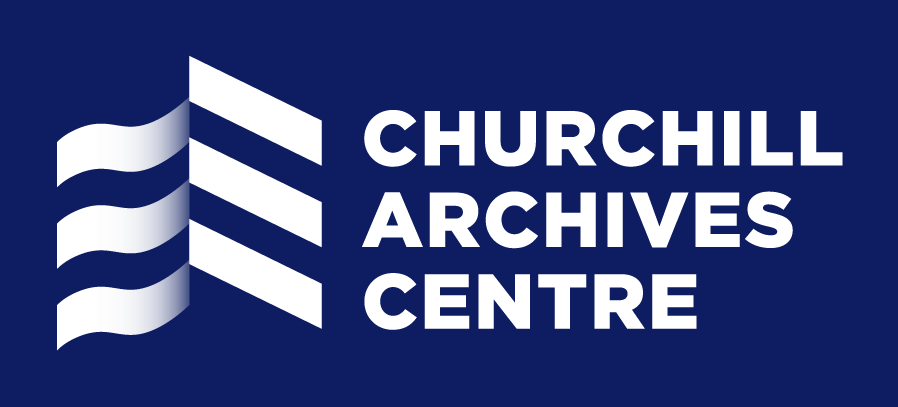An Introduction to the Churchill Papers
The whole collection is now commonly known as the Churchill Papers, but historically it has been divided into two distinct groups.
The papers dating from before 27 July 1945, when Churchill’s first term as Prime Minister ended, are known as the Chartwell Papers (catalogue reference CHAR).
The papers dating from after 27 July 1945 are known as the Churchill Papers (catalogue reference CHUR).
The reasons for the division and the names is explained in the section below on provenance.
Repository
Churchill Archives Centre
Churchill College
Cambridge CB3 0DS
United Kingdom
Telephone: 01223 336087
E-mail: [email protected]
Reference
GBR/0014/CHAR, GBR/0014/CHUR and GBR/0014/CHAQ
Title: The Papers of Sir Winston Churchill
Creator: Churchill, Sir Winston Leonard Spencer, 1874-1965, Knight, statesman and Prime Minister
Covering dates: 1690-1965 (main date range 1874-1965)
Extent and medium
The papers of Sir Winston Churchill comprise a total of 2,209 boxes. The material consists of a variety of formats including paper, photographs, and artefacts.
Content and context
Biographical history
A biographical history of Sir Winston Churchill is available on our Churchill Biography page
Scope and content
The papers consist of original documents accumulated by Sir Winston Churchill throughout his life (1874-1965). They have been divided into two sections: the Chartwell Papers (CHAR) and the Churchill Papers (CHUR), with some additional material (CHAQ). Together, the three sets of papers cover the following major areas:
Personal (CHAR 1, CHUR 1 and CHAQ 1/1 and 2/1), 1884-1965
The papers of Churchill as a private person. They include correspondence with or about his family and friends on non-public topics and papers relating to Churchill’s personal, financial and legal affairs and his social life.
Public and Political: general (CHAR 2, CHUR 2 and CHAQ 1/2 and 2/2), 1898-1964
The papers relating to Churchill’s activities as a person in public life other than his work as MP for a particular constituency or as a Minister. The content of these classes is very diverse and includes notes and correspondence with colleagues, acquaintances and the general public on topics of contemporary general interest, on party political matters, and on appointments to various positions. These classes also include papers relating to governmental business with which Churchill was not involved as a Minister or a member of the Cabinet.
Constituency (CHAR 3-CHAR 7, CHUR 3 and CHAQ 1/3-4), 1900-1964
These classes cover each of the constituencies represented by Churchill (Oldham, North-West Manchester, Dundee, Epping and Woodford). Each class contains correspondence and papers relating to local affairs generally, elections, meetings and speeches. There is correspondence with constituents on general political topics and about Churchill’s actions on behalf of local interests.
Literary (CHAR 8, CHUR 4 and CHAQ 1/5 and 2/3), 1890-1965
These classes contain correspondence with publishers, editors and printers, and other correspondence in connection with Churchill’s huge output of literary and journalistic work both during and after publication. The classes also contain material assembled for writing, notes and drafts, printer’s copy, proofs and reviews.
Speeches (CHAR 9, CHUR 5 and CHAQ 1/6 and 2/4), 1897-1965
The papers in these classes are arranged (as far as possible) by particular speeches and include notes, drafts, speaking notes, press releases, press cuttings, extracts from Hansard (the parliamentary record of debates in the House of Commons) and printed material.
Official (CHAR 10-27, CHUR 6 and CHAQ 1/7-10 and 2/5), 1902-1957
There is one class for each office held by Churchill. The departmental classes contain the correspondence, memoranda, prints, and other papers arising out of Churchill’s activities as a Minister responsible for particular departments and include correspondence with colleagues, officials, acquaintances, and the general public.
Acquired Papers (CHAR 28), 1690-1960
This class of papers was acquired by WSC at various times either by inheritance or gift.
Provenance
Source of acquisition
The papers dating from before 27 July 1945 when Churchill’s first term as Prime Minister ended are known as the Chartwell Papers (catalogue reference CHAR) and were originally owned by the Chartwell Trust. The papers dating from after 27 July 1945 (catalogue reference CHUR) are known as the Churchill Papers and were given to Churchill College by Lady Churchill in 1969.
In April 1995, grants from the National Heritage Lottery Fund and the John Paul Getty Foundation enabled the Chartwell Papers to be bought from the Chartwell Trust and consolidated the ownership of all the Papers in a charitable trust, the Sir Winston Churchill Archive Trust. The papers will be held in perpetuity at Churchill Archives Centre.
Custodial history
Since 1974 the Papers have been housed at Churchill Archives Centre. The papers were previously held at the house of Churchill’s son, Randolph Churchill, at Stour, East Bergholt, Suffolk while he worked on the official biography of his father. When Randolph died in 1968 the Chartwell Papers were transferred to the Bodleian Library, Oxford where Martin Gilbert continued work on the official biography. Additional material from Gilbert’s estate (CHAQ) was added and opened in 2024.
Arrangement
The papers have been divided into 2 groups, the Chartwell Papers and the Churchill Papers, with additional material in CHAQ. It was very difficult to divide all Churchill’s papers at a particular point in time so that there is some chronological overlap between the three groups.
The initial work of arrangement and listing was carried out between 1961 and 1964 by staff of the Public Record Office (PRO).
Appraisal
The staff of the Public Record Office destroyed redundant duplicates, mainly of printed material.
Chartwell Papers (CHAR)
The first stage of the PRO’s sorting and arrangement was the distribution of the papers into classes within which researchers could expect to find the documents, or the sort of documents, they needed. The Papers had originally been arranged according to contemporary requirements and the decisions of Churchill’s secretaries. Various methods had been employed which were not always carried out logically. The resulting confusion was increased by the removal of papers from place to place.
It was necessary to re-classify the majority of the papers, and this was done by considering the question “as a result of what function or in what capacity did Churchill produce or acquire this paper?” The two main classes which do not reflect this system of arrangement by function are Speeches (CHAR 9) and Acquired Papers (CHAR 28 which Churchill acquired at various times by inheritance or gift).
The defects of the PRO’s classification scheme arise mainly from the impossibility of dividing a man’s life into watertight functional compartments: a single document often contains material attributable to two or more classes. It was not always a straightforward matter to decide into what class a particular subject fell and some inconsistency inevitably arose in making a series of such decisions over a period.
After the distribution of documents into classes, each class was divided by year into chronological units, each representing the papers for one year, and the units were arranged into files according to their nature and bulk.
Complete list of classes (CHAR)
- CHAR 1: Personal, 1884-1945
- CHAR 2: Public and Political: General, 1898-1945
- CHAR 3: Political: Constituency: Oldham, 1900-1905
- CHAR 4: Political: Constituency: Manchester North West, 1904-1908
- CHAR 5: Political: Constituency: Dundee, 1908-1924
- CHAR 6: Political: Constituency: out of seat, 1923-1924
- CHAR 7: Political: Constituency: Epping, 1924-1945
- CHAR 8: Literary, 1890-1945
- CHAR 9: Speeches, 1897-1945
- CHAR 10: Official: Colonial Office, 1902-1908
- CHAR 11: Official: Board of Trade, 1906-1911
- CHAR 12: Official: Home Office, 1907-1911
- CHAR 13: Official: Admiralty, 1911-1915
- CHAR 14: Official: Duchy of Lancaster, 1915
- CHAR 15: Official: Munitions, 1917-1919
- CHAR 16: Official: War and Air, 1918-1921
- CHAR 17: Official: Colonial Office, 1921-1922
- CHAR 18: Official: Treasury, 1924-1929
- CHAR 19: Official: Admiralty, 1939-1940
- CHAR 20: Official: Prime Minister, 1940-1945
- CHAR 21: Official: Cabinet, 1908-1915
- CHAR 22: Official: Cabinet, 1920-1922 and 1924-1929
- CHAR 23: Official: War Cabinet, 1939-1945
- CHAR 24: Official: Committee of Imperial Defence, 1909-1915
- CHAR 25: Official: Committee of Imperial Defence, 1920-1922 and 1935-1939
- CHAR 26: Official: War Council, 1914-1915
- CHAR 27: Official: War Cabinet, 1917-1919
- CHAR 28: Acquired Papers, 1690-1932
- CHAR 29: Miscellanea
- CHAR 30: Obsolete Lists
Further information about the content of the papers is available in the catalogue.
Churchill Papers (CHUR)
In contrast to the Chartwell papers, the post-war Churchill papers remained largely in the order in which they had been accumulated and used for business. Their arrangement was based on the assessment of complete files (rather than the classification of individual papers).
Though the basic structure of the classes of the post-war Churchill Papers is the same as the arrangement of the Chartwell Trust papers there are important differences in the distinctions between classes and their detailed arrangement. The differences arise from the more orderly arrangement in which the papers had been maintained. For the most part, except for the literary material (CHUR 4), the papers had been placed in file series and were sometimes arranged according to their subjects (such as “political” and “private and personal”). These series were sometimes inconsistent, papers had been transferred between them, and their subject matter overlapped. No attempt was made to split and distribute these series and they have been assigned to the classes to which the majority of their papers belong.
Similarly, the original files were not split or distributed chronologically. The classes often contain groups of files which correspond with the original series and these groups have been chronologically arranged. The files themselves often cover several years and contain earlier material which was brought forward as business recurred. The electronic catalogue includes details of the complete chronological span of the files although the printed catalogue (available for consultation at Churchill Archives Centre) gives an indication of the period during which the file was in active use.
Complete list of classes (CHUR)
- CHUR 1 Personal, 1945–1965
- CHUR 2 Public and Political: General, 1945–1965
- CHUR 3 Political: Constituency, 1945–1965
- CHUR 4 Literary, 1945–1965
- CHUR 5 Speeches, 1945–1965
- CHUR 6 Official, 1945–1965
Further information about the content of the papers is available in the catalogue.
Access and use
Availability of digital copies
A digital edition of the Churchill Papers, published by Bloomsbury Academic, is now available online at www.churchillarchive.com and is freely available in our reading room.
Access conditions
The collection is open for consultation at Churchill Archives Centre, Churchill College, Cambridge. See our Visit us page for more information.
Material in the Chartwell Papers is open to researchers unless otherwise marked in the catalogue. Some material has been closed by the Cabinet Office or by Churchill Archives Centre in accordance with data protection legislation.
Finding aids
Access to the catalogue is available on ArchiveSearch.
Further information
Publication note
Transcripts of some of the documents in the Chartwell and Churchill Papers have been published in the Official Biography of Sir Winston Churchill’s life (and its companion volumes) entitled “Winston S Churchill” by Randolph S Churchill and Sir Martin Gilbert.
Many of Churchill’s speeches (found mainly in CHAR 9 and CHUR 5) have been published in “The Complete Speeches of Winston S Churchill” by Robert Rhodes James.
Where possible, the catalogue includes reference citations to these works (both of which are available at Churchill Archives Centre).
Related material at Churchill Archives Centre
Churchill Archives Centre holds a range of related archive collections. These include the papers of Churchill’s wife, Clementine Spencer-Churchill, son Randolph Churchill and daughters Sarah and Mary Churchill, press photographs, press cuttings, and the Broadwater Collection of Churchill family photographs and albums.
Churchill Archives Centre also holds the papers of several people whose careers were closely linked with Churchill, such as Sir John Colville, Sir George Harvie-Watt, and Sir John Martin.
Our Guide to Holdings can be filtered by both Churchill Family and by Staff and Colleagues.

